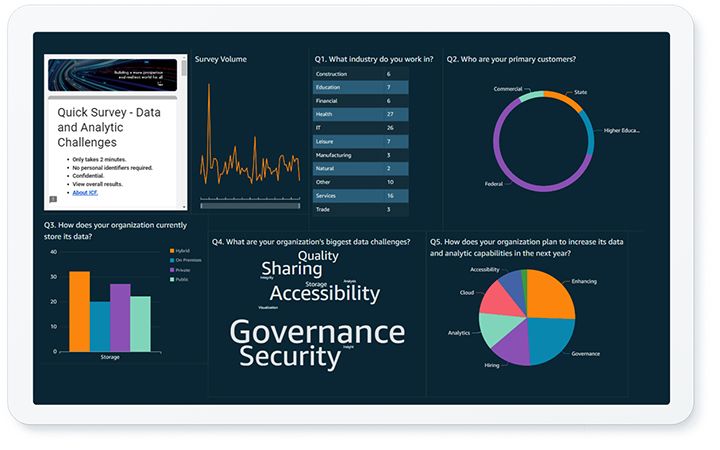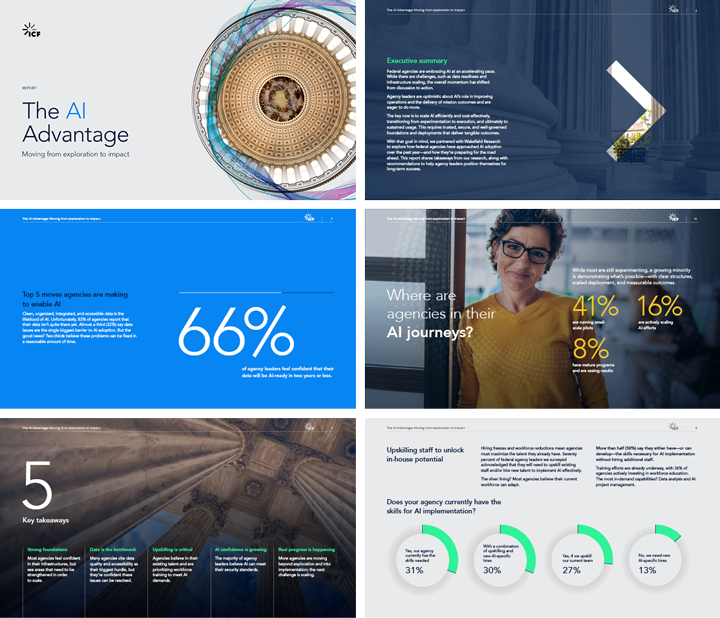
AWS DC Summit: A quick pulse check on data and analytics challenges
We were thrilled to participate in the recent AWS DC Summit, which provided an unequalled, in-person space for attendees across various industries to connect around shared interests in AWS, its technologies, and the capabilities of its vast range of partners and alliances. ICF created and deployed, in collaboration with our friends at AWS, a survey of event attendees with real-time visualization in Quicksight. Our goal was to informally assess the industry and customer representation, current data and cloud practices, plans, and challenges. While there was a broad distribution across many of the questions, data governance surfaced as a universal data challenge, and opportunity.


In biomedical research today, with increasingly vast and variegated amounts of data, nextgen technology, advances in cloud computing, data science, and artificial intelligence (AI) have created the potential for unlimited game-changing breakthroughs. As big data becomes bigger and more FAIR, we have an opportunity to establish new data sharing models and amplify team-based approaches that enhance the likelihood of increased discoveries that can meaningfully impact better health outcomes.
At the heart of the success or failure of modern biomedical research is its data and, fundamentally, the principles, standards, and practices applied to this data. This is the concern of data governance—distinct from data management which is the implementation of governance—and focuses on the availability, usability, integrity, and security of data.
Data governance is not just a technological challenge, or even just a data challenge. It is behavioral, cultural, and a very human consideration. For a governance model to be effectively designed, implemented, and optimized over time, a blended and multidisciplinary approach is needed. Such governance must be embedded at the very inception of any data initiative, rather than being an afterthought. Thoughtfully enacted, governance can liberate the value of data through enhanced and expedited collaboration that can deal with urgent public health problems in more timely ways, discover new cures quickly, and prevent exposures that precipitate disease.
In modern biomedical research, the disruptive impact of AI and advanced technologies—whose current tremors are likely to convert into full-scale earthquakes—are making possible more sophisticated research design and implementation. This research can take advantage of federated data governance (data mesh etc.), which offers a great number of leading-edge rewards (and risks).
Imagine a distributed model where the responsibility and authority for data management is shared across different departments or organizations that produce data but conform to common standards and mutually agreeable terms of use. This democratic approach can foster a more organic and dynamic method of handling data and sharing, closely mirroring the interconnected nature of various biomedical disciplines and the high value on research collaboration.
Yet, along with these opportunities, the landscape of federated data governance brings significant challenges. Data governance requires a high level of alignment, and both technical and organizational commitment from the get-go. Coordinating data governance policies across different teams or organizations can prove to be a complex and labor-intensive task, requiring upfront expenditures and temporary shifts in priorities. Data privacy, security, and compliance issues may be amplified in a decentralized model, emphasizing the need for proactive risk management and mitigation strategies.
Moreover, federated models necessitate a paradigm shift in how organizations perceive and handle data. Rather than proprietary information, data must be viewed as a valuable, shareable, even communal, asset. This necessitates the establishment of a culture of trust, collaboration, and transparency.
To navigate these complexities and fully harness the potential of federated data governance, a comprehensive, multidisciplinary approach is needed—one that is led by domain experts and integrates technology, data science, policy, and human behavior. The value in such an approach can only be unlocked by establishing a shared vision and effective communication channels up front. Together, stakeholders can develop a robust governance framework that enables discovery and respects the unique needs and constraints of different teams—while also ensuring data availability, integrity, usability, and security.
The advent of AI and other advanced technologies presents the biomedical research industry with an unprecedented opportunity to leverage large and complex data sets for potentially groundbreaking discoveries. However, as highlighted in the recent AWS DC Summit survey, these opportunities also present significant challenges related to data governance. Key among them is the adoption of federated data governance models, which distribute data management responsibilities across different departments or organizations. As we venture into this new landscape, a data-driven organization can enhance its data governance capabilities and prepare for federated models by:
- Embedding data governance from the outset: As with any data initiative, effective data governance must be an integral part of the strategy from inception. This approach will ensure the data is managed in accordance with the agreed principles, standards, and practices.
- Fostering a culture of collaboration and transparency: With the federated model emphasizing data as a shared asset, it is vital to establish a culture that encourages trust, collaboration, and transparency.
- Investing in relevant technology and infrastructure: Given the potential complexities of federated data governance, organizations must invest in advanced technology and infrastructure that can effectively handle the demands of managing and securing large and varied datasets.
- Investing in relevant technology and infrastructure: Cloud computing, web services, and advanced data management platforms make the move to federated data easier than ever before. Organizations can now select from a range of technological solutions to support data federation and tailor investments to the scale and scope of their mission. By taking a tailored approach, organizations can maximize impact while controlling costs.
- Ensuring robust risk management and mitigation strategies: Since the amplified data privacy, security, and compliance issues are prominent in a decentralized model, proactive risk management and mitigation strategies are critical to governance success.
- Promoting a multidisciplinary approach: As data governance is not solely a technological or data challenge, a multidisciplinary approach that combines technology, data science, policy, and human factors will be key to navigating the complexities and fully harnessing the potential of federated data governance.
As biomedical research increasingly leverages AI and nextgen technologies along with the vast quantities of data already available, the need for effective data governance becomes even more pressing. With the right strategies and practices, organizations can both enhance their existing data governance capabilities and make strides in the adoption of federated data governance models.
